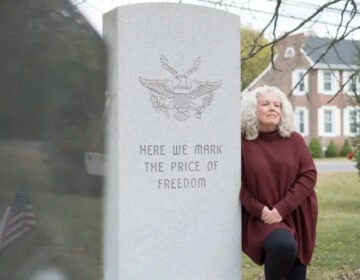Did Stockton U. do enough to protect students from members of ‘rogue fraternity’?
A woman filed a lawsuit Monday in N.J. st. court alleging she was sexually assaulted by a member of an off-campus fraternity at Stockton U., making it the fifth of the summer.
Listen 5:36
Stockton University, Galloway Township. campus. (Anthony Smedile for WHYY)
On Monday a woman filed a lawsuit in New Jersey state court alleging she was sexually assaulted by a member of an off-campus fraternity at Stockton University, making it the fifth such lawsuit this summer.
Court filings have described Pi Kappa Phi as a rogue organization, not recognized by the university, that harbored a culture of underage drinking and sexual assault.
In lawsuits describing conduct dating back to 2012, two women said they were drugged and raped by members of the fraternity. Another claimed a fraternity brother violently assaulted her in the frat house bathroom. Yet another said she was groped at a party.
The allegations against the fraternity did not come as a surprise to some Stockton students and faculty, who said Pi Kappa Phi’s controversial reputation was an open secret on campus.
Some students have spoken publicly of what they witnessed or heard about happening in the fraternity house in Egg Harbor City. The women who filed lawsuits also lodged formal complaints with the university.
Yet Stockton did not adequately explain to students the potential dangers of associating with Pi Kappa Phi members or attending parties at the frat house nestled in the South Jersey woods, students and a legal expert who spoke to WHYY suggested.
Stockton advised students to avoid unrecognized fraternities and sororities, but it did not explain on its website why any of those Greek groups had lost university recognition. The school also provided only minimal information about violations committed by fraternities and sororities in good standing.
“Stockton is choosing not to tell the full truth,” said Doug Fierberg, a Michigan-based attorney specializing in school violence, of the university’s warnings to students.
“Maybe [the fraternity or sorority] failed to have adequate membership dues. Maybe they hazed with shaving cream mustaches. Maybe they did harmless things that were still outside the realm of what were the organization’s expectations,” said Fierberg. “Those are different than engaging in dangerous activities that pose a serious risk of physical harm to students.”
Fierberg and some current students argue that Stockton should be held accountable for the actions of Pi Kappa Phi members, since it was aware of problems at the unaffiliated fraternity.
But others, including U.S Education Secretary Betsy DeVos, are skeptical of the idea that universities should be liable for activity that takes place off campus.
‘Unrecognized’
Stockton stripped Pi Kappa Phi of its university recognition in 2010, but the school does not explain why on its website, which simply lists “unrecognized groups” on campus.
On the site, Stockton warns students to “stay away from unrecognized groups for safety reasons, as these students are not regulated in any way by the University.”
Recognized groups at Stockton enjoy certain university services such as “professional staff and alumni advising and support, proactive educational programming, leadership development, oversight of risk management efforts, service opportunities, academic support” and have “insurance and policies related to hazing and sexual harassment.” Unrecognized groups have no such protections.
Stockton also warns incoming first-year students during orientation and Welcome Week to steer clear of Pi Kappa Phi and other unrecognized organizations.
But according to some current students, that is where the warnings end. Stockton does not disclose why Pi Kappa Phi lost its recognition in 2010 or why attending a party there could be a safety risk, the students said, even as the unofficial group of students calling themselves Pi Kappa Phi continued to operate out of an off-campus house.
“Why are there problems? What are the problems?” said Moneeba Khan, a Stockton University senior. “It should be clear what it means to be unaffiliated.”
Fierberg, the school violence attorney, agreed. He said Stockton should tell students about allegations of sexual assault against the fraternity.
“It assumes that students aren’t adults and aren’t smart enough to know information that they may be able to use to protect themselves,” he said.
Fierberg added that it would not be a privacy violation if Stockton publicized information about allegations against a fraternity and omitted the names of the people involved.
(A Stockton spokeswoman declined an interview for this story because of the pending lawsuits. She referred all questions to the state attorney general’s office, which is representing Stockton in court since it is a public university. The attorney general’s office declined to comment because the cases are ongoing.)
All five civil lawsuits — plus two others in which students said they were sexually assaulted by Stockton students but which do not involve Pi Kappa Phi — invoke the federal civil rights law Title IX, which guards against gender discrimination in public education.
According to the lawsuits, Stockton violated Title IX because the sexual assaults that occurred at Pi Kappa Phi or by fraternity brothers negatively affected the educational experience of the victims, a common legal strategy used by attorneys who represent victims of campus sexual assault.
But other legal experts said it may not be fair to blame a college or university for conduct that takes place off campus.
“There seems to be this willingness to say the institution should somehow be liable for [a] thing that happened [off campus], even though its ability to actually control that thing seems fairly illusory,” said Scott Schneider, a Texas-based attorney who represents educational institutions across the country.
Schneider likened modern colleges and universities to small cities, with their own police forces and other amenities. But he said some people expect more from their institutions of higher education than they do their urban centers.
“I might go out for barbecue, and somebody hits me in the head,” said Schneider, who lives in Austin. “I don’t immediately think, ‘Aha, the city should somehow be liable or responsible for this bad thing that happened to me.’ ”
The Trump administration appears to agree. According to a recent report in the New York Times, Education Secretary Betsy DeVos is planning to propose new rules that would hold colleges and universities accountable “only for formal complaints filed through proper authorities and for conduct said to have occurred on their campuses.”
Some of the alleged conduct in the five lawsuits related to Pi Kappa Phi took place on Stockton’s campus, but it seems to be an open question whether Stockton will face any legal trouble for incidents involving students that took place elsewhere.
Publicity around the lawsuits comes as Stockton opens its new campus in the heart of Atlantic City.
Although Stockton officials did not agree to an interview for this story, President Harvey Kesselman addressed the civil suits in several messages posted to the university’s website.
“That any student on our campus should have to fear for their safety is unacceptable and will not be tolerated,” Kesselman wrote. “As a university we will continue, from orientation to graduation, to build a culture where we respect and care for each other. We will continue to work with law enforcement to hold predators accountable.”
Warning signs
Stockton hasn’t recognized Pi Kappa Phi in eight years, but the fraternity continued to operate anyway, according to court filings.
One of the lawsuits filed this summer even suggested that in 2014 the fraternity participated in rush week, an on-campus recruiting event for sanctioned fraternities and sororities.
There were other signs that something was amiss at “Pi Kapp.”
In the spring, a group of Stockton students in a course on women, gender, and sexuality conducted a survey about unrecognized fraternities on campus. It was in response to “sexual assault and the targeted drugging of women’s drinks” at Pi Kappa Phi, the students said, but the survey was generalized.
Of the 193 respondents to the survey, more than half said they had gone to a party at an unrecognized fraternity at Stockton.
Almost 10 percent of people who said they had attended parties at unrecognized frats reported being sexually assaulted or harassed there.
“These are epidemic-level numbers,” the students wrote.
They sent a letter to the head of New Student and Family Programs, which provides services to incoming first-year students, including freshmen and transfer students, according to its website.
In their letter, the students laid out their findings and suggested they form a “student-led group” during new-student orientation and Welcome Week to speak “frankly to first-year students about the threat they face at these unaffiliated ‘frat’ parties.” An administration official turned them down, said their professor, Emily Van Duyne.
Sarah Holt, a Stockton junior, was “shocked but not surprised” by the results of the survey she and her classmates conducted last year.
“Maybe it was shocking to find out that it was happening at our school, because it kind of seems like a smaller or more quiet school,” Holt said.
The university of about 9,500 students sits in wooded Galloway Township, about a 20-minute drive from Atlantic City.
When Holt heard about the lawsuits over the summer, she thought that “it was about time that something happened, that it came out.”
In April, frustration with Pi Kappa Phi also boiled over into the March Against Rape Culture, an annual protest at Stockton to call attention to sex-based discrimination and violence.
One student came to the march with a sign that read: “END RAPE CULTURE. So basically fuck Pi Kapp.”
(An attorney for Pi Kappa Phi’s national organization did not respond to an interview request.)
Two Stockton faculty members told WHYY that students had discussed the problems at Pi Kappa Phi for years, yet those problems persisted.
“It indicates a pattern in which the people perpetuating this violence are not being held accountable,” said Betsy Erbaugh, an assistant professor of sociology and women’s, gender, and sexuality studies. “Every time that happens, every time violence or the threat of violence is reported, and something isn’t immediately done publicly and vocally and immediately, it sends a message that you can go on doing this.”
The lawsuits
Robert Fuggi believes there is a “climate and culture of systemic sexual assaults at Stockton.”
The Toms River-based attorney has filed seven civil lawsuits on behalf of women who say they were raped at Stockton or by university students. Five of the lawsuits describe conduct that occurred at Pi Kappa Phi.
According to Fuggi, there was a pattern of behavior among current and former Pi Kappa Phi members: spike a woman’s drink and then sexually assault her once she becomes incapacitated.
In one of the lawsuits, a former student and Pi Kappa Phi brother Zachary Madle allegedly raped a student identified only as M.R. (all of the plaintiffs are anonymous) after a February party, took videos of the assault, and then posted them to Snapchat. Madle was charged with invasion of privacy in that case, and the Atlantic County prosecutor’s office said the investigation is ongoing.
Madle was accused of sexual assault in another lawsuit as well, in which a woman identified as K.S. claims he choked and sexually assaulted her in the bathroom of the Pi Kappa Phi fraternity house in November, leaving her visibly bruised.
A former student named Zachary Novak allegedly assaulted a woman in her dorm room on campus in 2014 after the two returned from a Pi Kappa Phi party together, according to another lawsuit. Novak was pledging Pi Kappa Phi at the time. The assault allegedly left the plaintiff, D.N., with severe psychological trauma.
In the fourth lawsuit, a woman named S.U. said she became incapacitated at the Pi Kappa Phi house in September 2017 and woke up in one of the bedrooms as she was being sexually assaulted by a man she couldn’t identify. She went back to her dorm and, afraid to be alone, called her friend William Murphy, a Stockton EMT. According to the lawsuit, S.U. went to Murphy’s dorm where he tried to calm her down by giving her shots of rum. She says she became even more intoxicated and increasingly traumatized by the night’s events. Then, S.U. alleges, Murphy sexually assaulted her, too.
A fifth woman, D.D., claimed a Pi Kappa Phi brother asked her in late 2012 to flash her breasts to be able to enter a party for free. A month later, she said a Pi Kappa Phi brother groped her vagina and buttocks over her clothes at a party at the off-campus fraternity house.
“People have said to me, ‘Well, that goes on at every campus,’ ” Fuggi said, of sexual assaults at colleges and universities. “We know it does, but not to this level.”
(Attorneys for Madle and Novak did not respond to interview requests.)
Several of the women reported their sexual assaults to Stockton staff or faculty, and the university conducted Title IX hearings into the allegations.
But Fuggi said it wasn’t enough. He suggested Stockton could have conducted better internal investigations, done more to crack down on Pi Kappa Phi, or publicized the allegations against the fraternity to warn other students of the danger.
“When you sweep things under the rug,” Fuggi said, “the pile under the rug only gets bigger.”
WHYY is your source for fact-based, in-depth journalism and information. As a nonprofit organization, we rely on financial support from readers like you. Please give today.




